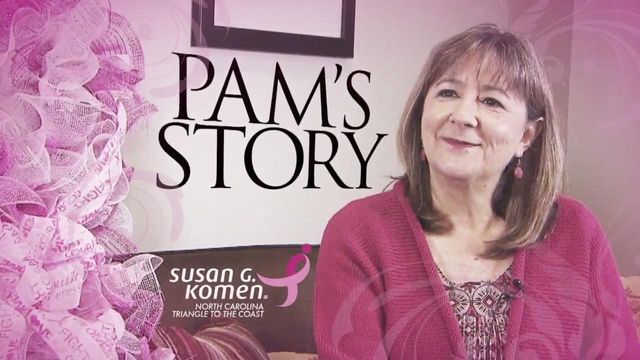Komen director learns 'new normal' after cancer spreads
Pam Kohl, executive director of the Susan G. Komen North Carolina Triangle to the Coast chapter, is sharing her hopes and fears about a diagnosis of metastatic breast cancer.
Posted — UpdatedKohl was speaking to her staff and the volunteers who form the Race for the Cure committee after a second bout with breast cancer and a mastectomy.
"We won't tell HR, but they look pretty good, yes," Kohl laughed about her prosthetic breast before breaking more difficult news.
"I had a biopsy last week, and I have been diagnosed with metastatic breast cancer," Kohl said. "So, here I am in February and still don't completely have a treatment path finalized."
Kohl, based on a hunch, pressed for the PET scan after some unusual test results.
"From the very beginning of my first mammogram, they said, 'This is nothing, but we have to check.' And then the biopsy, 'We really don't think it's anything,'" she said.
"Even when you have the best medical care and the best resources around you and the best friends, you still have to advocate for yourself, and you have to trust your intuition."
Doctors found lymph nodes near her lung – "hot spots" where the cancer had spread.
Kohl knows, from her work with the Susan G. Komen Foundation, that she is already the exception to the rule. Most women diagnosed with estrogen-positive (ER-positive) breast cancer, the kind she had seven years ago, don't see a recurrence. Most don't see that cancer spread.
"I'm definitely more scared," she said. "I'm hopeful, you know, but the fear is definitely outweighing the hope at the moment."
Kohl is trying to decide how much of her fear to share with her family and Komen staff.
"Managing my own fears, my own anxiety, with the people who are close to me is hard," she said, "and figuring out what and how to tell my kids."
Given the unusual nature of her diagnosis, Kohl and her doctors are outside the norm on her treatment plan.
"I would much rather them go cut it out," she said, "but I understand enough about this systemic breast cancer to know that's not necessarily going to solve it."
Kohl's personal and professional experiences convinced her to share her journey, even though the end is unknown.
"How do I tell this without making every ER-positive woman terrified?' she asked. "As the leader of Komen, how am I going to do this in a way that's inspiring?"
Kohl deflects away from her personal story to rely on the statistics.
"(It is) really important that every ER-positive woman stays vigilant, but this doesn't happen to 90 percent of you," she said.
"It helps me to know that all of us are going to work together, we're going to raise that $1 million this year, and we are going to have 10,000 people there cheering all of us on," she said. "That urgency has become real to me as far as raising the research money."
"We live in this amazing community of RTP and have amazing medical resources," she said, pointing out that she is on a new drug that was unavailable just three years ago, a treatment that has worked for 10 years in some patients.
"When we heard my breast cancer is no longer curable, that wasn't as frightening to me because I know if it's manageable, that's OK." Kohl said.
For now, she won't have to face more surgery or radiation or chemotherapy, and she will continue to raise money and advocate for others.
"Keep asking questions, get your mammograms, keep doing your therapy," she said.
• Credits
Copyright 2024 by Capitol Broadcasting Company. All rights reserved. This material may not be published, broadcast, rewritten or redistributed.






